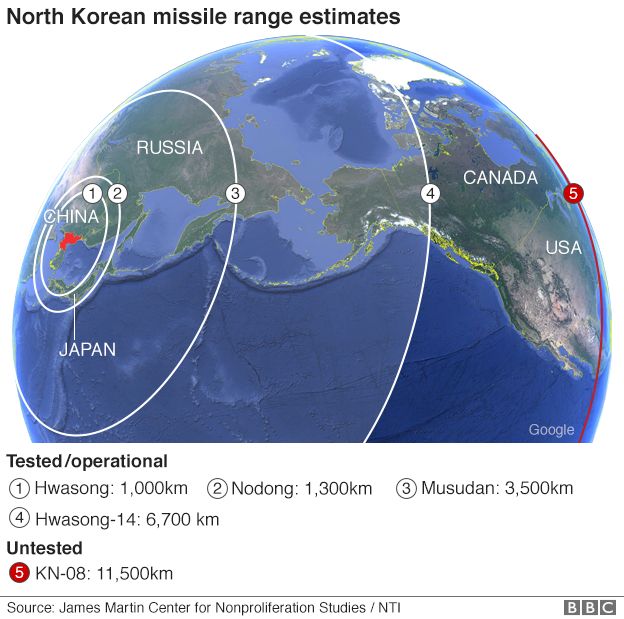
This article is more than
8 year old"We're not your enemy," Rex Tillerson said, adding that the US wanted a dialogue at some point.
Meanwhile, a senior Republican senator said President Trump considered going to war with North Korea as an option.
Pyongyang claimed that its latest missile test could hit the US west coast and beyond.
"We do not seek a regime change, we do not seek the collapse of the regime, we do not seek an accelerated reunification of the peninsula, we do not seek an excuse to send our military north of the 38th parallel," said Mr Tillerson, referring to the border between the Koreas.
"We're not your enemy, we're not your threat but you're presenting an unacceptable threat to us and we have to respond."
The second test of an intercontinental ballistic missile (ICBM) on Friday, celebrated by North Korean leader Kim Jong-un, was the latest to be conducted in defiance of a UN ban.
Barbara Plett Usher, State Department Correspondent
North Korea's recent long-range missile tests have deepened concern about the threat Pyongyang poses to the US mainland, and strengthened determination here to prevent any strike. That's what the president had in mind in his war talk with Senator Lindsey Graham.
The Pentagon has updated military options, but at the same time says a confrontation would be catastrophic. In light of that, Mr Tillerson repeated at length that the US wasn't seeking regime change and said the goal was dialogue, but one not based on the assumption that North Korea could keep its nuclear weapons.
Pyongyang has categorically refused such terms.
The strategy, said Mr Tillerson, is a sustained campaign of peaceful but intensifying economic pressure to change its mind. But given the advances in ballistic technology demonstrated by the recent ICBM tests, there's growing doubt that denuclearisation is a realistic possibility.
As always, there are no good options when it comes to North Korea, but less time to pursue them.
President Trump has repeatedly criticised China, which shares a land border with North Korea and is its closest economic ally, for not doing enough to stop Pyongyang's weapons programme.
However, Mr Tillerson took a more diplomatic approach, saying that "only the North Koreans are to blame for this situation".
"But," he added, "we do believe China has a special and unique relationship, because of this significant economic activity, to influence the North Korean regime in ways that no one else can."

In a separate development, Republican Senator Lindsey Graham said that Mr Trump told him that there would be a war between the two countries if Pyongyang continued with its aim to develop a missile programme with the US in its range.
"He has told me that. I believe him," Mr Graham said of his conversations with the president in an interview with NBC's Today programme.
"If there's going to be a war to stop [North Korea], it will be over there. If thousands die, they're going to die over there. They're not going to die here. And he [Mr Trump] has told me that to my face."

Despite the ongoing tests, most experts believe Pyongyang does not yet have the capability to miniaturise a nuclear warhead, fit it on to a long-range missile, and ensure it is protected until delivery to the target.
They say many of North Korea's missiles cannot accurately hit targets.
Others, however, believe that at the rate it is going, Pyongyang may overcome these challenges and develop a nuclear weapon within five to 10 years that could strike the US.